
Blog Post
SEO

Axel
Zawierucha
published on:
12.09.2013
The 'Entity'-Based Search – Is It the End of Keyword Research?
Table of Contents
Search engine optimization has been based on keywords from the outset. However, with Google's ability to semantically analyze content, the fundamental conditions are changing. The Knowledge Graph showed the potential future paths of search, but that's far from the end. What this means for SEO and keyword research and optimization is discussed in this blog post.
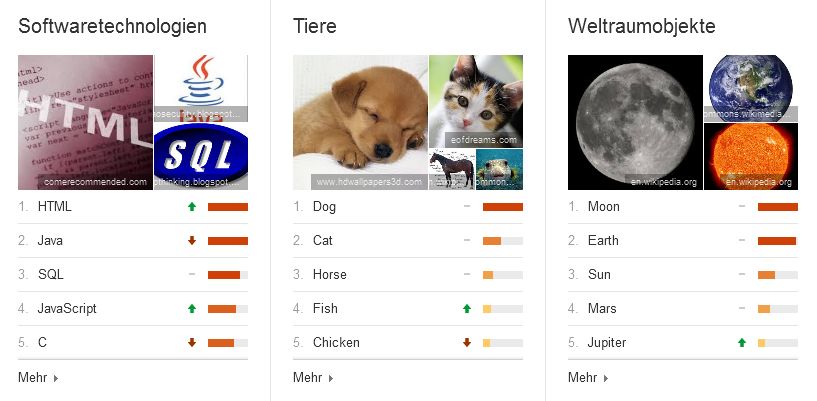
In the past, a search query process was relatively simple: A user entered one or more search terms into Google's search box and received results that Google's algorithm deemed relevant based on those keywords. However, it hasn't been that simple for a while, and the Venice Update most likely highlighted this.
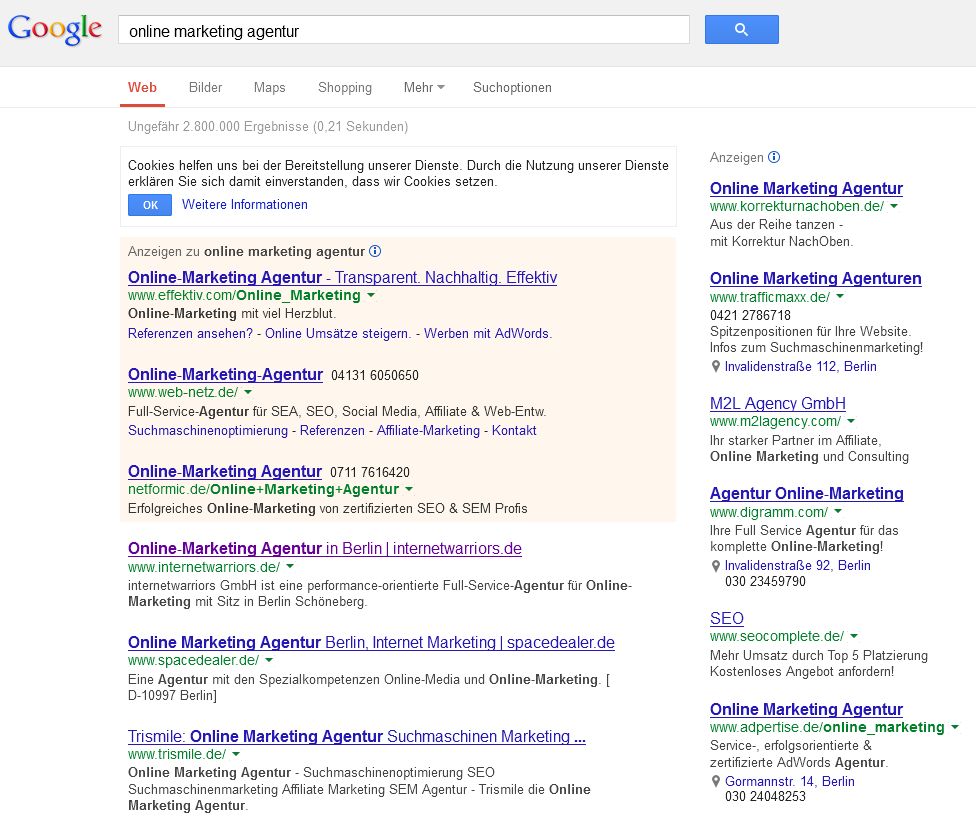
Google local results
Explicit and Implicit Influences on Search Results
Alongside the explicit aspects of a search query, namely the terms directly entered into the search field, implicit aspects are becoming important, influencing the results: What device is being searched from, at what time, in what location, in which city, in which country, and what does the searcher's search history look like?
On Moz.com, Tom Anthony summarizes it with this formula:
Search Query = Explicit Aspects + Implicit Aspects
But what if this is just the beginning? Is it conceivable that in a few years, search results will no longer be based on search queries, but implicit factors will determine everything? The app Google Now could offer a preview of the future, as this is exactly what happens: Users are presented with information tailored to their behavior and habits, without having entered a keyword-based search query: "You receive cards with helpful information for your day—even before you search for them."

Google Now
Various tests and updates in the search results and search algorithm in recent years have caused the results list to significantly stand out from the pure website-based results of the past today and give a hint of the future:
Personalized search results: locally tailored results and the integration of content from the Google Mail account
Social signals, the integration of authorship, the topic of Author Rank
The identification of structured data and the integration of rich snippets into search results
Google's growing understanding of natural language as opposed to purely keyword-based search queries
It becomes evident: Understanding instead of indexing is Google's goal. The Knowledge Graph is the beginning of this. The ultimate goal could be entity search.
The Future of Entity Search
In an interview with Barbara Starr, an expert in semantic search, on Search Engine Land, the expert hints at what the development of semantic search could mean for the future of SEO. With the introduction of the Knowledge Graph last year, Google pointed out that it's no longer about pure character strings. Instead, the search increasingly relies on the interpretation of "search objects." To interpret search queries in this way, Google creates entities, an "entity graph" that maps the meaning and relationships between terms. The basis for this is partly the interpretation of the searcher’s intent, as well as the user's context: Where are they located, what device are they using, etc.
A purely entity search would mean for websites: Those not recognized as an entity will not be found! The conclusion here is that SEOs would be required in the future to view their content not through the keyword lens but instead to create machine-readable entities that answer fixed queries. Semantics and structured data are the important keywords here.
The Webmaster Tools provide a hint at the increasing importance of structured data, as they have been evaluated there for some time:
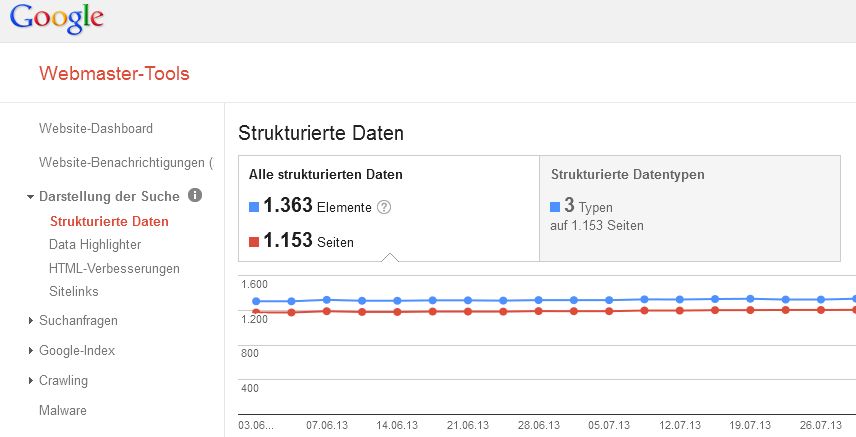
Structured data in Webmaster Tools. A tiny preview of entities can be found, for example, in the "Top Charts" in Google Trends. Here, search queries are already being assigned to a (currently relatively manageable) number of entities.
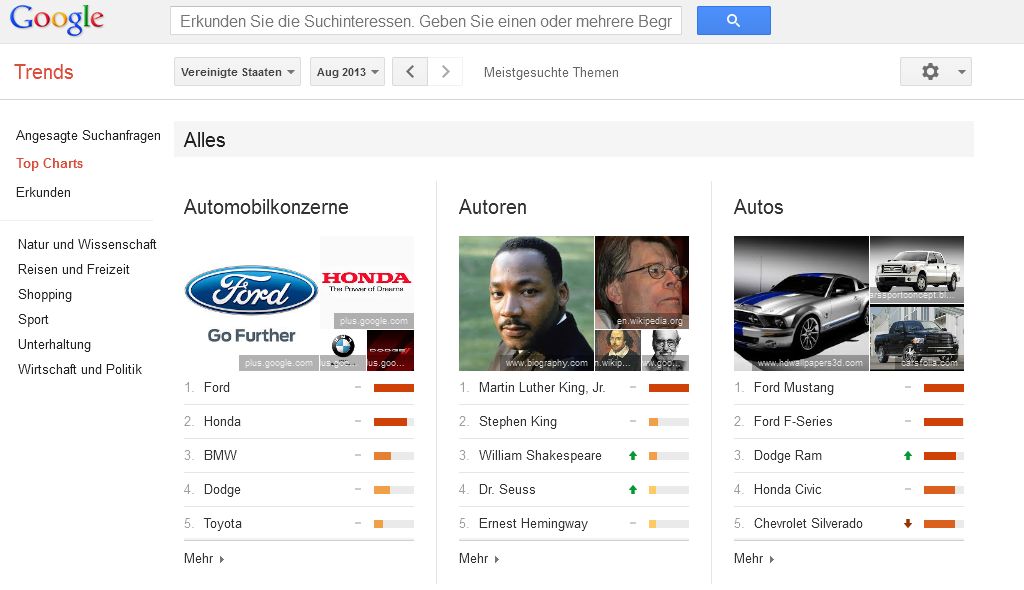
In a purely entity-based search, the use of keywords on a website would no longer be important, it would even be completely ineffective as long as Google does not recognize entities on the website.
Of course, it is not (yet?) at that point. But it can't hurt to start dealing with markups and tagging with schema.org early on. Even if not all markups show a visible effect in search results yet, it is sensible to use as many relevant markups as possible in advance to be prepared.

But Google goes one step further: Bill Slawski points out on his blog about a patent where, under the title "Search entity transition matrix and applications of the transition matrix," it’s not only about assigning people, things, or places to entities, but Google creates "search entities" and analyzes the relationships between them.
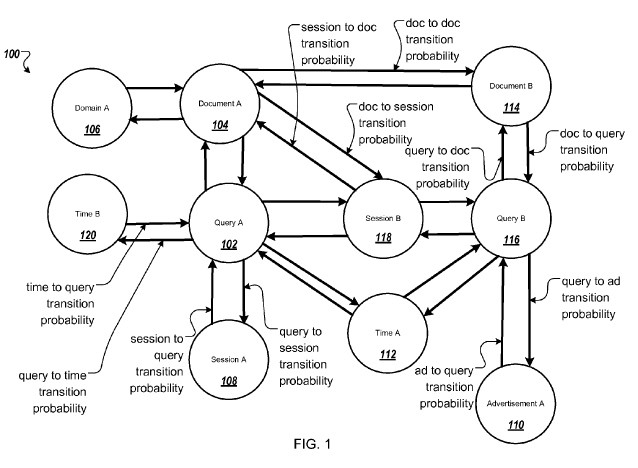
The patent abstract reads like this:
Methods, systems, and apparatus, including computer programs encoded on computer storage media, for using search entity transition probabilities. In some implementations, data identifying entities and transition probabilities between entities is stored in a computer-readable medium. Each transition probability represents a strength of a relationship between a pair of entities as they are related in search history data. In some implementations, an increase in popularity for a query is identified and a different query is identified as temporally related to the query. Scoring data for documents responsive to the different query is modified to favor newer documents. In other implementations, data identifying a first session as spam is received, and a spam score is calculated for either a second session of queries or a single query using transition probabilities. The second session (or single query) is identified as spam from the spam score.
So what are "search entities" anyway?
The search query that a user enters
Documents delivered in response to this search query
Documents the user clicks on
The time spent on these results
The search session in which the user makes the search query (defined by a specific duration, through a specific number of search queries, up to a certain time of inactivity, by the user's login, or by the similarity of the search queries entered, defined, for example, by similarity in spelling, through abbreviations or synonyms)
The time of day when the search query is made
Ads delivered as a result of the search query
The domain associated with a document
Link texts in a document
What does Google do with these entities?
A probability value is calculated based on the relationship between these different types of entities. These probabilities can have various effects, such as:
Identifying relationships between different entities as well as the strength of these relationships by, for example, evaluating the user's search history.
Values from one entity can be inherited to other, related entities using these relationships.
Entities for which there is not enough search history data can be assigned values using related entities for which sufficient data is available.
Search results can also be ranked more precisely and vertical search results delivered using these relationships.
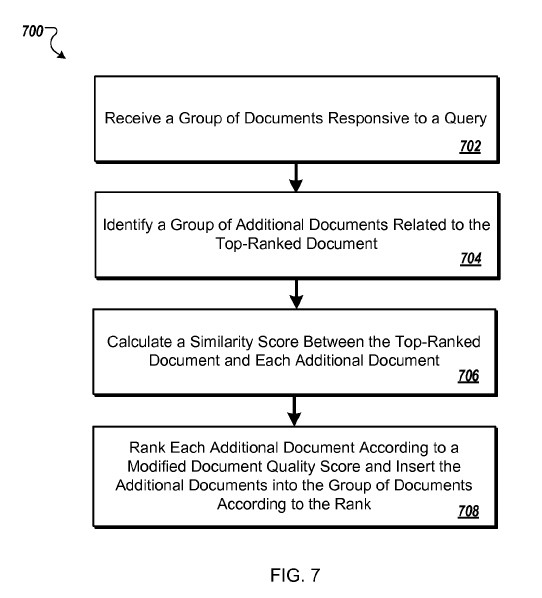
Search queries that are gaining in popularity can be identified, and for which current results are preferentially delivered (Remember the Freshness Update nearly two years ago.)
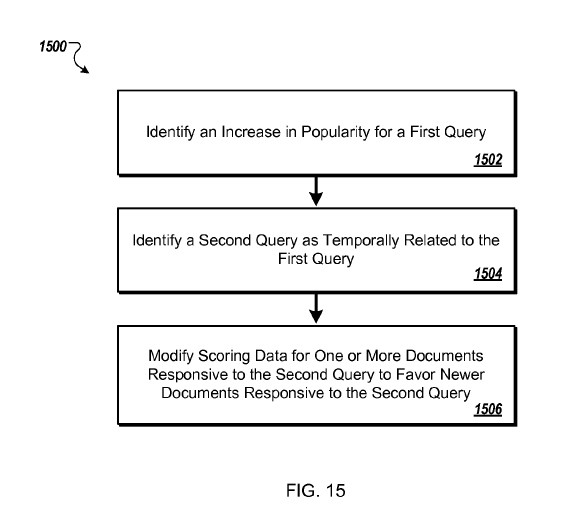
The relationships between entities can be used to suggest search queries to users.
Based on links from related documents, results for certain search queries can be re-ranked.
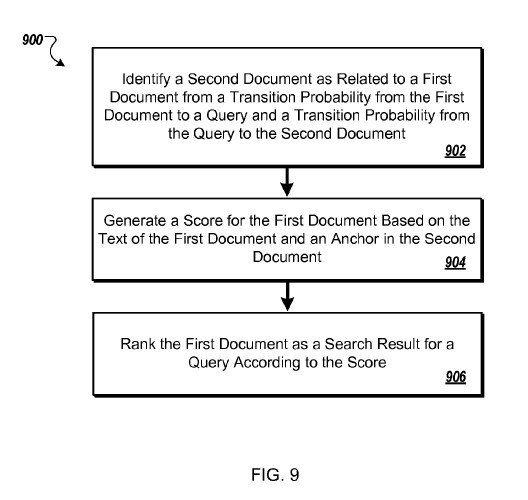
And what does this mean practically? An example.
With the help of entities, Google determines the strength of the relationship between a document (search result) and the entered search query and calculates the likelihood of the user clicking on this result for a particular search query. An important criterion for the quality of a result can be, for example, the length of time spent. The illustration from the patent provides a small insight into the analyzed entities:
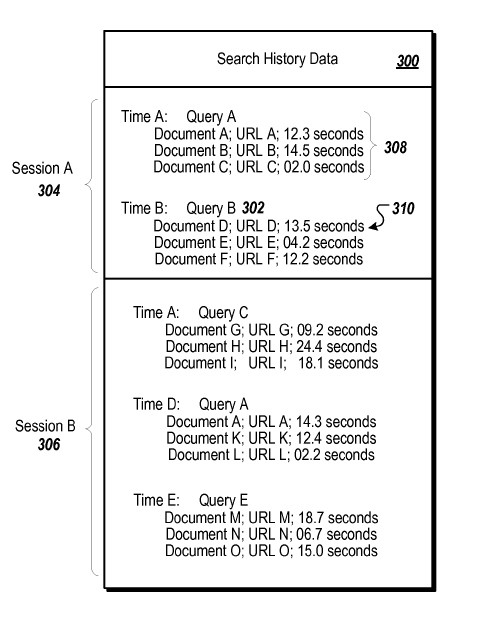
Conclusion: Have Keywords Lost Their Importance?
In light of these developments, one might dismiss the importance of keywords and the practice of keyword research. However, that would be premature. While optimization today is more complex than it was years ago, when the use of keywords in the title tag, headers, and content was among the most important measures, even as it increasingly moves towards semantic search, focusing on concepts rather than keywords, the usefulness of keywords should not be overlooked.
Keyword research and analysis is still a legitimate practice that offers many helpful insights:
It helps analyze what language the target audience speaks, ensuring that one's content is understood and properly perceived by users.
Keywords can help understand the intentions and needs of the target audience.
Synonyms and related terms can be identified, which play an essential role in high-quality content at least for good writing style, readability, and understanding, even if Google's search entirely relies on entities.
Keyword research helps to uncover connections and appropriately display the categorization of content on the website or online shop through suitable categories. A logical structure with sensible navigation may eventually be redundant for Google, but it will always be necessary from a usability perspective.
Keyword research assists in the rough assessment of competition and the value of a keyword: How complex is the optimization likely to be, how expensive is it to focus initially on AdWords instead of SEO? Which product areas should be expanded and enriched with content, for which business sectors is it particularly worthwhile to expand the editorial area and gain links?
However, it's crucial always to keep the context in mind. Keyword-based landing page creation isn’t always the best option. Instead, it may become increasingly important in the future to analyze the target audience by their contexts and provide relevant landing pages for these groups and their respective situations.
SUBSCRIBE TO THE NEWSLETTER NOW
In any case, it's important to monitor the developments of semantic search and learn how Google categorizes and interprets terms. Besides the aforementioned Google Trends, the suggestion function and related search queries can help with this. It's also important to keep an eye on how the Knowledge Graph evolves, to understand what definitions Google sets for keywords, and what terms help Google understand keyword connections and prevent incorrect associations. Here, keywords as a natural part of language usage are still important but do not replace structured data and—more intensively in the future—entities.
Looking for expert support in the field of search engine optimization? Contact us; our SEO experts are happy to advise and support you with all on-page and off-page questions and practically implement the latest insights for you and your company. Get in touch with us!

Axel
Zawierucha
Axel Zawierucha is a successful businessman and an internet expert. He began his career in journalism at some of Germany's leading media companies. As early as the 1990s, Zawierucha recognized the importance of the internet and moved on to become a marketing director at the first digital companies, eventually founding internetwarriors GmbH in 2001. For 20 years – which is an eternity in digital terms! – the WARRIORS have been a top choice in Germany for comprehensive online marketing. Their rallying cry then and now is "We fight for every click and lead!"



